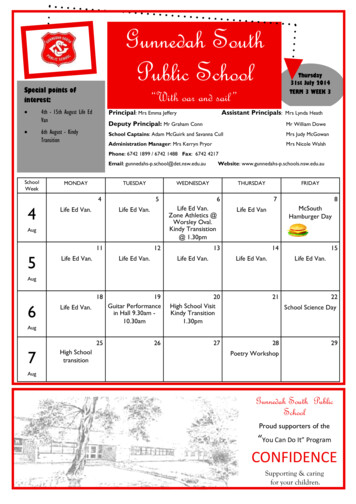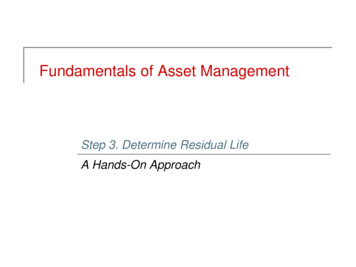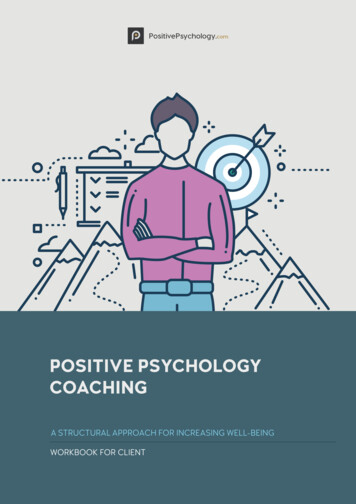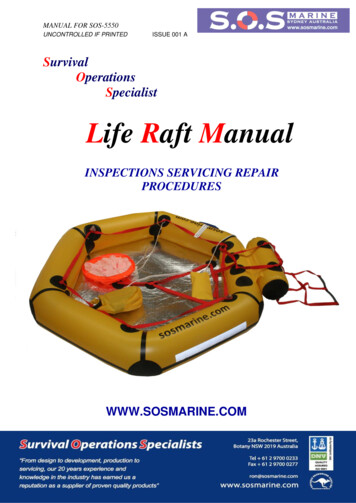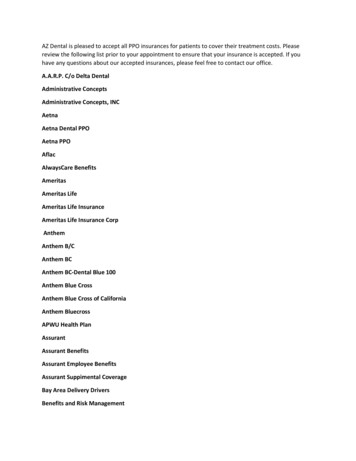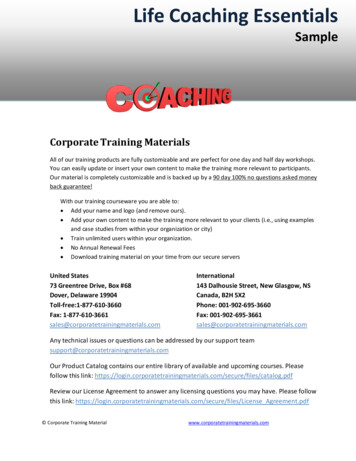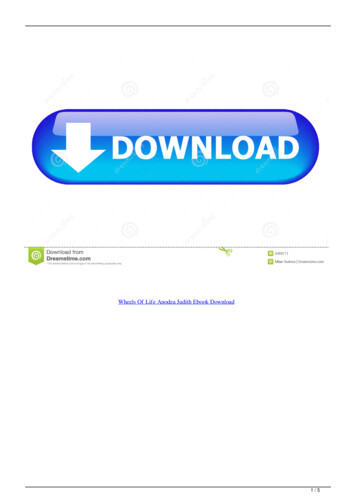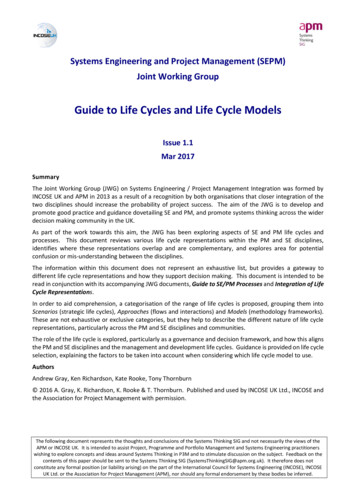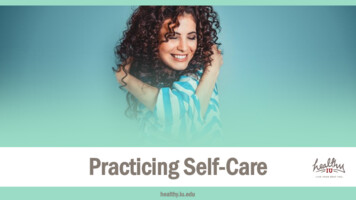
Transcription
Practicing Self-Carehealthy.iu.edu
What is self-care?Self-care is what people do for themselves to establish andmaintain health, and to prevent and deal with illness.It is a broad concept encompassing: Hygiene Environmental factors Nutrition Socio-economic factors, and Lifestyle Self-medicationWorld Health Organization, 1998.healthy.iu.edu
Why self-care is important?Self-care helps you:Manage daily challengesPut more passion in what you doBuild resilience in the face of adversityProtect your physical, mental, andemotional health Better adapt to change Recover from setbacks Mental Health First Aid, 2020.healthy.iu.edu
Seven Pillars of Self-Care1234567Knowledge& thyEatingRiskAvoidanceGoodHygieneRational Useof Products/ServicesThe International Self-Care Foundation, n.d.healthy.iu.edu
Pillar 1: Knowledge & Health LiteracyCapacity of individuals to obtain, process and understand basic healthinformation and services needed to make appropriate health decisions. Strong health literacy skills result in better health and well-being Poorer health literacy results in:o Less healthy choiceso Riskier behavioro Less self-managemento Poorer overall healthThe International Self-Care Foundation, n.d.healthy.iu.edu
Pillar 2: Mental Well-being, Self-awareness &AgencyMental well-being includes: Life satisfactionOptimismSelf-esteemMastery and feeling in controlHaving a purpose in lifeSense of belonging and supportThe International Self-Care Foundation, n.d.healthy.iu.edu
Pillar 2: Mental Well-being, Self-awareness &AgencySelf-awareness is the personal,practical application of anindividual’s health knowledge totheir own health situation.Health LiteracyInternalization ofKnowledgeSelf-AwarenessThe International Self-Care Foundation, n.d.healthy.iu.edu
Pillar 2: Mental Well-being, Self-awareness &AgencyAgency is the capacity and intention to take action based onknowledge and awareness of the situation and condition.Self-awareness and agency provides:Self-awareness The starting point for future self-care activities Allows room to identify and act on areas needing improvementThe International Self-Care Foundation, n.d.healthy.iu.edu
Pillar 3: Physical ActivityPracticing moderate intensity physical activity such as walking,cycling, or participating in sports at a desirable frequency.Regular exercise can: reduce the risk of many non-communicable diseasesSignificantly improves health, fitness and moodControl weightReduces the risk of metabolic illnessesThe International Self-Care Foundation, n.d.healthy.iu.edu
Pillar 4: Healthy EatingFocuses on the role that diet plays inself-care, maintaining health, andreducing the risk of diet-related noncommunicable disease.Having a nutritious, balanced dietwith appropriate levels of calorieintake.The International Self-Care Foundation, n.d.healthy.iu.edu
Pillar 5: Risk AvoidanceAvoidance or reduction of behaviors that directly increase the risk of disease ordeath.Behaviors that reduce health risks are often some of the most achievable selfcare practices: Not/quitting smokingDrinking in moderationProtecting yourself from the sunPhysical distancingAvoiding shaking hands with othersDriving carefully and wearing a seatbeltThe International Self-Care Foundation, n.d.healthy.iu.edu
Pillar 6: Good HygieneFocuses on the actions and behaviors thathelp to maintain health and prevent thespread of diseases. Washing hands regularlyRegular oral healthcareProper food handlingWearing masksKeeping masks cleanSneezing or coughing into your elbowThe International Self-Care Foundation, n.d.healthy.iu.edu
Pillar 7: Rational & Responsible Use of ServicesDiagnostics and medicines: Being aware of dangers Using rationally and responsiblywhen necessaryThe International Self-Care Foundation, n.d.healthy.iu.edu
Ethical Principles of Self Care in PracticeRespect for the Dignity and Worth of Self A violation lowers your integrity and trustResponsibility of Self Care It is our responsibility to take care of ourselvesSelf Care and Duty to Perform Recognition that the duty to perform as ahelper cannot be fulfilled, if there is not, at thesame time, a duty to self careGreen Cross Academy of Traumatology, 2020.healthy.iu.edu
Standards of Humane Practice of Self CareUniversal Right to Wellness Right to wellness associated with self carePhysical Rest and Nourishment Deserves restful sleep and physical separationfrom workEmotional Rest and Nourishment Deserves emotional and spiritual renewalSustenance Modulation Must utilize self restraint regarding what and how muchyou consume (e.g., food drink, drugs, stimulation)Green Cross Academy of Traumatology, 2020.healthy.iu.edu
Self-Care Planninghealthy.iu.edu
Inventory of Self Care Practice: PersonalBody Work Monitoring all parts of your body for tension Use techniques that reduce or eliminate such tensionSleep induction and maintenance Use healthy methods that induce sleep and a return to sleepunder various circumstancesEffective methods for assuring proper nutrition Monitoring food and drink intake with the awareness of theimplications for health and functioningGreen Cross Academy of Traumatology, 2020.healthy.iu.edu
Inventory of Self Care Practice: PersonalPsychological Effective behaviors and practices to sustain boundariesbetween work and play Effective relaxation time and methods Frequent contact with nature or other calming stimuli Effective methods of creative expression Effective skills for ongoing self care Effective methods of self assessment and self awarenessGreen Cross Academy of Traumatology, 2020.healthy.iu.edu
Inventory of Self Care Practice: PersonalSocial/Interpersonal At least five people, highly supportivepeople you can call Securing informal and professional help Involvement in activities resulting in abetter world or sense of satisfactionGreen Cross Academy of Traumatology, 2020.healthy.iu.edu
Inventory of Self Care Practice: ProfessionalWork Life synergy Devoting sufficient time and attention to bothBoundaries setting Recognizing things you can changeGetting support/help at work Peer supportGenerating work satisfaction Noticing and remembering achievementsGreen Cross Academy of Traumatology, 2020.healthy.iu.edu
How to Create Your Self-Care PlanMake a formal, tangible commitment: Written, specific and measurable promisesto self careSet deadlines and goals Specific to self careGenerate strategies that work, and followthem Plan must be attainable and followed withgreat commitmentGreen Cross Academy of Traumatology, 2020.healthy.iu.edu
How to Create Your Self-Care PlanDetermine what you will do Stick to the basics Add self-care activities to your calendarWho can I call at any time? Who can you trust? Who can you talk to about the good andbad?Who can I reach out to for more help? When feeling overwhelmed, anxious, or sadhealthy.iu.edu
Simple Self-Care Practices Stay hydrated Plan a spa day (yes, at home) Take a hot bath or showerw/aromatherapy Indulge in a post-shower ritual Get outside/get moving Eat foods that give you life Limit your screen timeSpend time w/your fur babiesListen to music/danceWrite about itPractice breathing exercisesGet enough sleepCall SupportLinc – 888.881.5462healthy.iu.edu
Resources Relax and Breathe (video)Progressive Muscle RelaxationDeep BreathingBoundary SettingSelf-regulating Stress WebinarSeries Recordingshealthy.iu.edu
Thank you and be well!healthy.iu.edu
Pillar 2: Mental Well-being, Self-awareness & Agency Agency is the capacity and intention to take action based on knowledge and awareness of the situation and condition. Self-awareness and agency provides: The starting point for future self-care activities Allows room to identify and act on areas needing improvement Self-awareness
